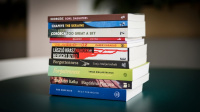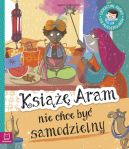Progress in Latin America (in the post-Covid reality) / Progreso en América Latina (en una realidad post-Covid)
The COVID-19 pandemic once again shed light on core and age-old challenges facing Latin America. They include governance, public health, economic progress, and social policies, as well as citizen participation in the search for solutions to pressing problems. New technologies which in recent years became accessible to many of the region's poor allowed millions of marginalized Latin Americans to follow how other places around the world were dealing with the health crisis and the political, economic, and social challenges it posed. The authors of the edited volume, both acclaimed and young researchers from the Americas and Europe, address questions about the lessons learned by Latin American countries and societies from the pandemic. The chapters of the edited volume analyze the geopolitical and geoeconomic conditions of the region in the midst of the pandemic, point out key issues which require immediate state intervention, and reflect on the human rights which Latin Americans once again had to fiercely defend, maintaining their hope for a better tomorrow.
Magdalena Lisińska holds a PhD in political science (2018) from the Jagiellonian University in Krakow where she also completed Bachelor of Arts and Master of Arts degrees in International Relations (2012, 2014), as well as a Master of Arts degree in Latin American studies (2015). She was a visiting researcher at the Center of Studies on Citizenship, State and Political Affairs (Centro de Estudios en Ciudadanía, Estado y Asuntos Políticos, CEAP) of the School of Social Sciences at the University of Buenos Aires (2016, 2017), at the Research Unit on the State, Citizenship and Family (Unidad de Investigación y Extensión sobre Estado, Ciudadanía y Familia, ECiFa) of the School of Social Sciences at the National University of Quilmes (2022, 2023) and at the Regional University Center Atlantic Zone (C.U.R.Z.A. - Centro Universitario Regional Zona Atlántica) of the National University of Comahue (2023). She also conducted her research at Helsinki University (2017), the University of London, the School of Advanced Studies (2018), and the Free University of Berlin (2018, 2021). Benefiting from the Erasmus Program, she spent a semester at the Autonomous University of Madrid (2016) and was a visiting professor at the University of Catania (2023). She has received the START 2021 scholarship from the National Foundation of Polish Science (2021), JU Rector's Award for scientific achievements (2020, 2023), the award of the Polish International Studies Association for the best monograph (2020), the award of the Cracow Branch of the Polish Political Science Association for the best monograph (2020).
Monika Sawicka holds a PhD in Political Studies (2018), a Master of Arts in Portuguese Philology (2010), and a Master of Arts in International Relations from the Jagiellonian University. She studied at the Faculdade de Letras at the University of Porto in the 2009-2010 academic year (Erasmus Exchange Program) and participated in the Academic Educational Cycle Sustainable Development - Global Challenges organized by the Institute of Geography and Spatial Management at the Jagiellonian University (2012). Between 2011 and 2022, she conducted several research projects in Brazil, including in the Archive of Diplomatic Documentation of Brazil's Ministry of Foreign Affairs in Brasilia and Rio de Janeiro. Visiting lecturer at the Federal University of Santa Catarina and State University of Rio de Janeiro. She is a member of the Terra Brasilis Foundation.
Informacje dodatkowe o Progress in Latin America (in the post-Covid reality) / Progreso en América Latina (en una realidad post-Covid):
Wydawnictwo: Wydawnictwo Uniwersytetu Jagiellońskiego
Data wydania: 2024-10-30
Kategoria: Socjologia, filozofia
ISBN:
Liczba stron: 298
Kup książkę Progress in Latin America (in the post-Covid reality) / Progreso en América Latina (en una realidad post-Covid)
Zobacz także
Jigsaw, zaciekły wróg Punishera, łączy siły z Wielebnym Samem Smithem. Ten guru dobrze zna Franka, a na dodatek służy demonicznej sile i chce po swojemu...
Książę Aram nie chce być samodzielny Jedna z baśni, które zachwycają i uczą. Dzięki przygodom fikcyjnych postaci mały czytelnik poznaje świat, otrzymuje...
















